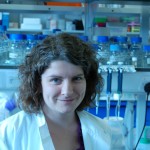 Dr. Miriam Gifford is an Assistant Professor at Warwick HRI/Warwick Systems Biology. She’s excited by new technological advances sweeping biology; there are new genome sequences every day. What she’s really optimistic about, however, is a critical component to all these systems — a whole new way of thinking. It’s no surprise then that her contribution to The New Optimists is in Part 4: The Ways of Science.
Dr. Miriam Gifford is an Assistant Professor at Warwick HRI/Warwick Systems Biology. She’s excited by new technological advances sweeping biology; there are new genome sequences every day. What she’s really optimistic about, however, is a critical component to all these systems — a whole new way of thinking. It’s no surprise then that her contribution to The New Optimists is in Part 4: The Ways of Science.
Her team are, she says, ” interested in how an organism interacts with its environment. The mechanisms that facilitate this interaction are particularly important for plants since they are sessile yet still cope with environmental extremes. They can’t simply walk away from trouble, instead they modify their body plan and development to deal with stresses such as nutrient deficiency, herbivore attack and drought.”
In April 2010, she awarded a BBSRC grant of ~£1 million (£998K) for a project entitled ‘Comparative cell specific profiling to understand the molecular basis of nodulation’. The project is for 3 years, and is with Nigel Burroughs and Sascha Ott at Warwick Systems Biology.
Miriam is one of the panelists for the British Science Festival event on 15th September 2010, chaired by Sue Beardsmore. Please do come, or participate on-line — more information about how to do so will be posted shortly.
More about Miriam’s personal research interests: She uses bioinformatic and cell-specific genomic techniques to understand how specialised cells in the root function to enable plants to cope with nitrogen limitation in the environment. Current research in her lab uses comparative genomics to compare environmental responses in the legume Medicago truncatula to the non-legume Arabidopsis thaliana at the cell-type level to gain insight into the evolutionary origin of nodulation.









